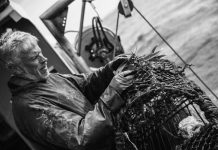If you find yourself in the Midlands, and a strange man asks you this question: ‘Eh lad, can you do the Rutland Roll?’ What would be your reply?
Would you: A. Slap his face. B. Shake your hips in a sexy circular manner. or C. Pick up your fishing rod, clamp it under you armpit and wave your hands around like a psychotic windmill?
The correct answer is of course C. The Rutland Roll might well sound like a cheese bap or even a bizarre homo-erotic wrestling competition that hairy men indulge in during long winter nights, but it is in fact a style of fly-retrieval, invented by the veteran game anglers of Rutland Water, who want their lures to move through the water faster than conventional flies.
The back-end of the fly fishing season can get very tame on little rivers, where the cheeky but diminutive brown trout rely on hatching flies and floating nymphs for food. As the cold weather starts, the fly life stops. Flies stop hatching. Nymphs stop nymphing. And the whole fly fishing exercise becomes pretty academic and boring.
Out on the big reservoirs like Rutland and Grafham, Pitsford and Eyebrook, things are very different. At the back end of the season when the fly life disappears, the big hungry omnivorous rainbow trout turn their gastronomic attention to fry-feeding.
These big reservoirs serve as home to huge populations of coarse fish, like roach, rudd, perch, carp and bream. All of which spent the early summer months spawning babies. So, by the autumn, their progeny have grown into fat little toddler fish fry, which provide top high-protein nosh, to any rainbows keen enough and quick enough to feed on them before the larder-empty days of winter begin.
Fry are small and fat and fast. So, if you’re a fly angler trying to imitate the actions of a fat fry snack, you have to be able to retrieve your fry-imitating lure with real speed. Conventional retrieves like a figure-of-eight or short foot-long pulls, simply aren’t swift enough to make the fry pattern look real.
Because of this, the Rutland boys have developed the Rutland Roll, a method of retrieval which involves holding your rod under your armpit to allow both hands to retrieve line simultaneously, hand over hand, in a windmill like fashion, causing the lure to move at scorching speed across the water.
And the favourite fry-imitating pattern amongst the Midlands reservoir fly anglers at this time of year, is the Minkie. Made out of dyed mink fur, the Minkie came into being as a refined, classy, or maybe just kinky adaptation of the Zonker.
The Zonker is made out of common or garden rabbit fur —lots of it. The fur is soft and wavy, so with each pull, the back of the fly flattens as its brought forward and then it blooms upwards when it stops, causing an enticing pulsating motion. The Zonker was modified by fly guru Dave Barker, using mink fur which is softer, longer and even more sexy.
‘Mink fur can be hard to find’ explained Andy Miller at Eyebrook reservoir. ‘The winter coat of mink fur is best. It’s thicker and denser with a proper under-down around the long hairs. Summer fur is a bit sparse and not so “effective”.
Andy is a committed Minkie maker and Minkie fisher. And he doesn’t just fish his Minkies at the back end of the season, when the fish are ravenously fry feeding, he finds they work well all through the hot months too. He carries boxes of Minkies in all colours and sizes. ‘Size depends on the behaviour of the fish on the day’ he says ‘And colour changes help when the fish are torpid or just lazy. Although, at this time of year white undoubtedly out-fishes any other colour by 95 percent’.
Minkies can be made in a range of sizes and they can be made to sink or float depending on whether or not they have wire wound into their bodies, or even steel balls added as weighted eyes. Andy swears that a splash of red wound in near the throat is a killer addition too, because it gives the attacking trout a target to aim for, in the same way that some plugs work better when they’ve got eyes painted on them.
One of the Rutland crew has even developed a Minkie pattern with a foam head, called the ‘suspender Minkie’, that can float on the surface and be scooted across the top, in jerky tweaks imitating a wounded fry.
Rainbow trout can get very aggressive when they’re fry-feeding, and apart from just chasing after slower stragglers, they will often launch themselves upwards through a shoal of fry like an Exocet missile, only to come crashing and thrashing down again, stunning their prey. Then, they swim back through the wounded ones gobbling them up in mouthfuls. This is the exact moment to have your floating fry-imitating Minkie on the surface, wriggling and wiggling its kinky fur.
‘Don’t go light’ says Andy. ‘Fish light at your peril. I use eight pound leader minimum, and I don’t like using any of those fluorocarbon leaders either. It’s too thin. And it sinks. For surface Minkie fishing you need strong ordinary mono. Something beefy enough to absorb the shock of those aggressive takes. You need to be prepared to get hit by the bigger fish. It’s the big over wintered fish you’re looking to catch, the ones that have turned cannibalistic and have started to target the fish fry as food’.
You don’t have to have mastered the complications of the Rutland Roll to catch winter fry-feeding fish. Sometimes you can get lucky doing absolutely nothing. ‘What most people don’t realise is that fish love to take Minkies on the drop’ says Andy. ‘The fur still pulsates even with the slightest water current, or even the action of the fly descending through the water can make it wiggle. Sometimes a trout will be exhausted or lazy and they’ll be sat there and grab the Minkie as it floats down. You’d be amazed at how many fish I catch on the drop’.
If you have managed to get your Rutland Roll rollicking along nicely, you don’t have to worry about going too fast either. ‘You’ll never out-pace a trout on the retrieve ‘says Andy. ‘If a trout’s seen your Minkie and he wants it. He’ll have it. No matter how fast you roll, he’ll get you’.
So, in these long troutless winter months ahead, if you’re not at your vise getting kinky with your Minkie fur, you can always practise your Rutland Roll, by borrowing a Jack Russell, tying a rat-scented ball of cotton wool on the end of your fly line, and seeing if you can roll-retrieve it across the back yard before the dog nails it.









